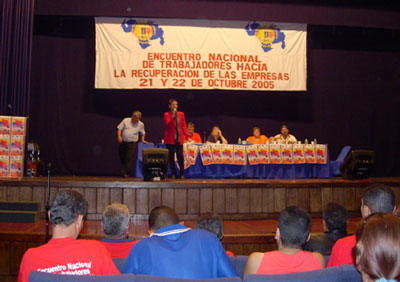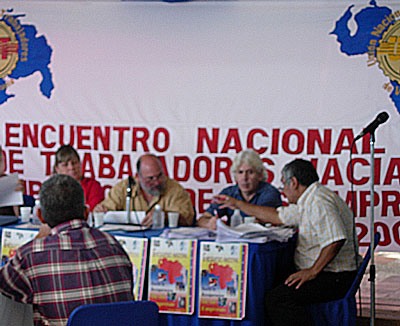Workers' representatives and trade union activists from around the country met in Caracas on October 21-22, in the National Gathering of Workers towards the Recovery of Companies. The main aim of this meeting, called by Venezuela’s National Workers’ Union (UNT), was to bring together workers involved in experiences of factory occupations and different forms of workers’ management.
Workers' representatives and trade union activists from around the country met in Caracas on October 21-22, in the National Gathering of Workers towards the Recovery of Companies. The main aim of this meeting, called by Venezuela’s National Workers’ Union (UNT), was to bring together workers involved in experiences of factory occupations and different forms of workers’ management.
The meeting was called in preparation for the 1st Latin American Gathering of Companies Recovered by the Workers, which will take place in Caracas on October 27-29. (http://www.mintra.gov.ve/encuentro_latinoamericano/). The Latin American Gathering is jointly organised by workers in occupied factories in Brazil, Argentina, Uruguay and Venezuela, the Venezuelan UNT and the Uruguayan PITCNT, and has the support of the Ministry of Labour in Venezuela. Workers from occupied and recovered factories from Argentina, Brasil, Uruguay, Perú, Ecuador, Puerto Rico and Panama will participate.
At the National Gathering there were workers present from Invepal (formerly Venepal), where the workers had struggled for expropriation under workers’ control of the paper mill that had been declared bankrupt by its formers owners. There were also representatives from Inveval (formerly CNV), the valve-making factory which the workers had occupied for more than two years. The workers finally won the expropriation of the factory under some sort of workers’ management. There were also workers from the state owned electricity generator and distributor CADAFE, where the attempts of the workers to introduce cogestion (as workers’ management is known here) have clashed with the attempt of the managers of the company to maintain their decision making power. A total of 200 workers from all over the country, both from the public and private sector, were present.
One of the first speakers at the gathering was Eduardo Murua, president of the Argentinean “Movement of Recovered Companies - MNER” (http://www.mnerweb.com.ar/). He explained the experience of factory occupations in Argentina as an alternative in the struggle against unemployment and the destruction of jobs. The main emphasis of his speech was on the idea that the workers can only rely on their own struggle and on their own strength and said that workers in Venezuela should take the initiative themselves and not wait for the government to give them the green light. He argued that if a factory is closed down by the employers “the workers should occupy it, try to start production, and discuss the legal aspects later”. He also explained how the MNER has managed to achieve higher wages and shorter working hours than in similar companies in the private sector, and then linked their experience to the struggle of workers in private capitalist enterprises for the same conditions.
Minister of Labour: factory occupations not a problem but the solution to a problem
Also present at the meeting was Minister of Labour Maria Cristina Iglesias. She explained how the idea for the Latin American Gathering had come from the workers themselves, particularly workers from recovered companies in Argentina, Brasil and Uruguay. It was they, together with a number of trade unions in the continent, that had asked President Chavez whether Venezuela would host such a meeting. Iglesias said that when workers occupy factories that have been abandoned and try to restart production, this should not be seen “as a problem but rather as a solution to a problem” caused by the bosses closing down these companies. She added that not taking action would be like “dying of hunger in a supermarket and not daring to open a tin of sardines”. She emphasised that while there is unemployment maintaining a “factory closed is a crime”.
 |
Minister of Labour Maria Cristina Iglesia addresses the meeting |
She underlined the importance of the Latin American Gathering since it meant “that these struggles are no longer isolated”. The meeting will have three main axes, she explained, one for workers in occupied factories to exchange experiences and draw political conclusions, another in which trade unions and trade union organisations will also link up and discuss how to support these struggles, and finally one in which governments and parliamentarians from different countries will discuss the legal framework of this movement of factories run by the workers. The Gathering will also include an exhibition of videos and pictures of the occupied factories in the continent. “They are not showing these examples because they are very afraid,” said Iglesias, who explained that such examples of companies that in one way or another have been recovered by their workers exist even in the United States. “We should never lose sight of where we come from and our class”.
Minister Maria Cristina Iglesias also explained how this struggle of companies recovered by the workers is linked to “what has always been our goal: that the workers run production and that the governments are also run by the workers”.
Examples were given of how these worker-recovered companies can cooperate beyond national borders. For instance paper mill Invepal could collaborate with workers in printing companies in Argentina that are run by the workers. The workers at occupied factory Cipla in Brasil could buy raw materials from Venezuelan state-owned Pequiven and then sell some of its products to Venezuelan state-owned oil industry PDVSA. Many such examples were discussed, but it was also stressed that these should not be seen merely as commercial exchanges, but rather should benefit all groups of workers involved, through training, transfer of technology, etc.
Workers management in strategic industries
Another one of the speakers at the meeting in Caracas was professor Mike Lebowitz. He went into some of the debates that are now taking place in Venezuela in relation to workers’ management. He explained how this is a key part of the Bolivarian Revolution: “nothing will make the enemies of this process happier than the failure of Venezuela’s path to co-management, because workers, especially in Latin America but elsewhere too, are starting to look at the development of co-management here as a real alternative to the despotism of the workplace”. He also made clear the differences between what is known as co-management in Venezuela and co-management in Germany, where “it was a means of incorporating workers into the project of capitalists … in Venezuela though, co-management is an alternative to capitalism”.
Lebowitz also discussed the flaws of self-management in Yugoslavia where “the focus of workers within each firm was their own self interest” and “what was missing was a sense of solidarity with society as a whole”. As a result this system in Yugoslavia operated “to increase inequality, to breakdown solidarity of society – leading ultimately to the dismembering of Yugoslavia.” He explained that co-management in Venezuela is trying “to avoid this particular mistake … it stresses that enterprises do not belong to the workers alone – they are meant to be operated in the interest of the whole of society”.
Amongst other things, Mike Lebowitz also made his opinion clear on the debate about whether there can be worker management in strategic industries. “If industries like oil production and electricity generation and distribution are to be excluded from co-management, what is that saying to the workers in those industries?” he asked. “That we don’t trust workers to be able to make decisions in the interests of society? What kind of vision for socialism of the 21st century is this?” He then added: “indeed, what are you saying but that when decisions are important, capitalism, state capitalism is the answer – but not co-management or socialism of the 21st century”.
Lebowitz explained that these contradictions, and others, are normal and implicit in the process and can be overcome “through democratic discussion, persuasion and education”. He ended up by saying that “nothing will make the enemies of the Bolivarian revolution more unhappy than the success of co-management”.
Workers must rely on their own strength
Luis Primo, from the Caracas-Miranda Coordination of the UNT and member of the Revolutionary Marxist Current, also spoke, giving the meeting a brief outline of the history of the struggle for workers’ management. He also explained the destruction of Venezuela’s manufacturing industry. According to figures he gave, in 1999 there were nearly 12,000 manufacturing companies in the country, but now the figure was less than 7,000, which meant a loss of more than 100,000 manufacturing jobs. At the same time 90% of Venezuela’s companies were in the service sector. This extreme situation was due to the fact that “capitalists are no longer interested in production” when they can get much quicker returns through speculation. The main emphasis in his speech was that the workers could only rely on their own strength and their own struggle. He proposed that the UNT should set up teams in every region of the country to organise the occupation and recovery of factories that have been paralysed. He concluded by quoting from Marx when he said, “the emancipation of the workers must be the act of the working class itself”.
 |
Luis Primo, UNT coordinator and CMR member, gives brief history of struggle for workers' management |
Apart from the interesting contributions of the different speakers, the main aspect of this meeting was the eagerness of workers’ representatives to participate in the debates. Dozens queued to explain the struggle in their factories, the problems they faced from directors in the public sector when trying to implement different forms of workers’ management, the plans they had to take over factories left idle by the bosses, etc. There were workers from a recently reopened factory in Zulia which makes pipes for the oil industry; workers from privately owned oil refinery Oxydor in Valencia, fighting for expropriation under workers’ control; workers from different plants of the multinational Parmalat with the same demand, etc.
Even though some important groups of workers were absent from the meeting, the mood of those present was enough to show that the expropriation of Venepal and CNV earlier this year has opened the floodgates and that many groups of workers around the country are now looking to them as an example to follow. Significantly, all notebooks given to participants in the meeting when they registered had been made in the new Invepal under workers’ management.
